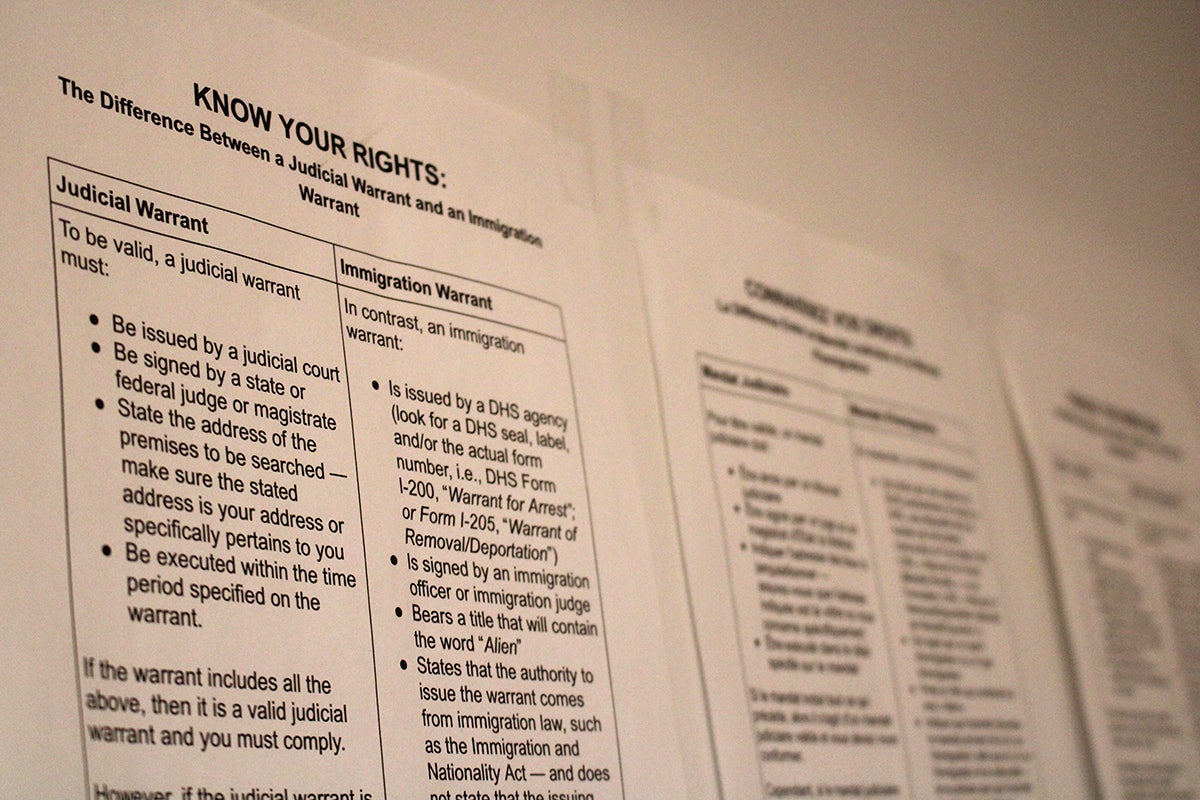‘Devastating’ impact from Trump administration’s immigration policy
Miller-Wilson, of HIAS Pennsylvania, said that the Trump administration has introduced additional legal challenges for asylum seekers, but prior to January 2025, the process was still arduous, arbitrary and costly.
“Things are so bad now, but so many people don’t realize actually half of it was always that bad,” she said.
Miller-Wilson said that asylum seekers, once they’re allowed into the country following a credible fear interview, have one year to petition for asylum. They have to find a lawyer, and aren’t able to file for work authorization until six months after submitting their asylum application.
“Most of them have fled with the clothes on their back,” she said. “Literally. I mean, I was talking to a client who fled in the middle of the night because soldiers came because they thought that he was gay, he was at his parents’ house, and they murdered his father, who refused to say … where his son was. And so he slipped out. His mother slipped him out the back door, and he just ran and ran and ran until he crossed out of Uganda and was able to get to safety. So that’s very common.”
Miller-Wilson said the work that Asylum Pride House does is “critical” for supporting asylum seekers who have filed a legal petition but are forced to wait to apply for work authorization and are unable to make money right away.
“This is before January 2025, you come in, you’re totally vulnerable,” she said. “You have nothing. You have no way to get anything until at least six months after you file a legal petition.”
President Donald Trump has made several changes that impact asylum seekers since taking office in January. Trump’s “one big beautiful bill,” passed in July, introduced changes to the filing process, requiring asylum seekers to pay $100 to submit their asylum petition, and an additional $100 each year until their case is resolved. Asylum seekers now also have to pay $500 to submit their work authorization application.
Miller-Wilson said the work authorization process under the current administration has been delayed, making the wait time for work permits even longer.
The administration has also fired some immigration judges, Miller-Wilson said, leaving even fewer resources to deal with the case backlog. Meanwhile, the asylum judges that remain have been subject to a “chilling effect” of anti-immigrant rhetoric.
“The judges have gotten the certain message loud and clear that we don’t really believe any of these people are telling the truth or deserve asylum,” she said. “If you have a grant rate that is too high, we’re going to start wondering what you’re doing, and probably accuse you of helping undocumented people or just get rid of you by firing you, or just yell at you, or whatever. So there’s higher scrutiny on that level.”
That scrutiny intensifies one of the preexisting challenges for asylum seekers: Proving asylum has become even more challenging, Miller-Wilson said, especially for those seeking refuge due to persecution because of being LGBTQ+.
“Uganda, you have a law you can point to, but there are other countries where it’s not so clear,” she said. “It’s more sort of like culturally, they’re homophobic, and so you’ll see a lot of assaults, and then attempts to go to the police, and then the police didn’t do anything, and then maybe even further assaulted the victim, right? But it’s very hard to prove that that happened, because police records disappear and everybody denies it. And how are you going to get a police guy from Sudan to testify that? Like, ‘Oh yeah, he reported the crime to me, and I ignored him.’ He’s not going to say that.”
Some advocates are also reporting that affirmative asylum cases, which are heard by an asylum officer in U.S. Citizenship and Immigration Services, are being pushed into immigration court as defensive claims, which automatically places the person in removal proceedings, Sirois said.
 Victoria Sirois is founder and director of Asylum Pride House, a West Philadelphia-based organization providing housing and wraparound services to LGBTQ+ asylum seekers. (Emily Neil/WHYY)
Victoria Sirois is founder and director of Asylum Pride House, a West Philadelphia-based organization providing housing and wraparound services to LGBTQ+ asylum seekers. (Emily Neil/WHYY)
“There’s just a lot of assumptions around what people are coming to the U.S. seeking protection for and why,” Sirois said. “You know, quote, unquote, some are more valid than others, when really it’s all just people trying to find somewhere safe to live and find a community that they can be a part of and not have fear of being targeted or at risk, or their family being at risk … It’s pretty devastating right now. I think we’re just going to keep seeing things like this happen, more restrictions.”
Sirois said the organization is also working with immigrants who are pursuing other legal pathways to residency, including those impacted by the Trump administration’s freeze on funding for refugee resettlement services and the end of Temporary Protected Status for immigrants from several countries.
“We’re trying to navigate with more complex cases than we’ve really seen before, people that really didn’t think that they needed to apply for asylum, but now statuses like TPS are being revoked for people, and there’s a bit of panic in that not having some other kind of status is really dangerous,” she said. “So we’re seeing folks that you know would not have usually reached out, but are now really looking for some sort of support and referrals.”
